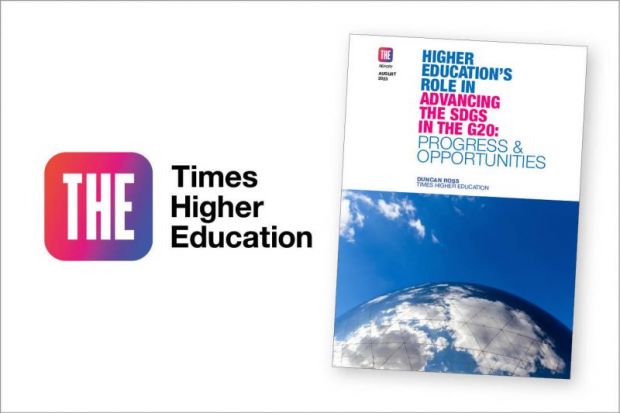Governments in the G20 are underutilising higher education institutions, which are in a unique position to help catalyse progress on reaching the United Nations’ Sustainable Development Goals (SDGs), a new report by Times Higher Education concludes.
The report, ‘Higher Education’s role in advancing the SDGs in the G20: progress and opportunities’ released at the G20 Universities Impact Summit in India, finds that higher education institutions’ role extends far beyond contributing to just SDG 4 - quality education - and that the university sector has the power and influence to significantly impact all 17 of the SDGs.
The report draws on the unique data used to create Times Higher Education’s Impact Rankings, which assess universities’ contribution to the SDGs through four key aspects: their teaching; their research; their outreach to governments and communities; and their stewardship of their own resources, such as their campuses and their staff.
The report identifies three key opportunities where G20 governments can better utilise their higher education systems to drive the delivery of the goals as the 2030 deadline for their implementation draws near:
- Relevant Research: Universities contribute to the SDGs by carrying out research in a wide range of areas from food security to health and the environment, but the report highlights key SDGS where there are relatively low levels of academic output in the G20 nations, for example SDG 1 - No poverty. Additional research in SDGs with lower academic output is required, which is a challenge for universities and governments too. Nations with the greatest need for effective and impactful research in these SDGs are likely to be the ones with the least financial ability to fund the research.
- Partnerships for the Goals: Universities are well placed to implement SDG 17 – partnership for the goals – as they have the capacity and knowledge to extend across sectors and international boundaries. The key challenge is targeting this work to make the most of limited resources, which is where the Impact Rankings can help by shining a spotlight on areas of academic excellence across all of the SDGS to assist effective matchmarking for investments and collaborations. Such partnerships can contribute to knowledge sharing, innovation, and broader global cooperation.
- Government and higher education linkages: Strengthening communication and collaboration between governments and higher education institutions is essential, the report concludes universities can play a vital role in providing expertise, evidence and insights to policy. This cooperation can help to reduce the economic inequalities that are evident in the world of higher education as well as the broader world.
Duncan Ross, THE’s Chief data officer and report author, said:
“Collectively, G20 nations wield tremendous political and economic power and so their ability to address the SDGs is absolutely critical.
“Higher education institutions have made in huge strides in measuring their progress towards the SDGs and shows where they can maximise their impact at a local and national level.
“The G20 can leverage higher education institutions as powerful partners to reach the SDGs. The report identifies key opportunities – fostering relevant research, building partnerships, and enhancing government-university collaboration – to accelerate global sustainability efforts.”
Download the report here.
***ENDS***
Notes to editors
- To interview Duncan Ross, find out more about the report, please contact Claire Baumforth, Director of corporate communications THE at claire.baumforth@timeshighereducation.com or communications@timeshighereducation.com or call: 07833 234133
- Duncan Ross has extensive experience in data mining and co-founded DataKind UK, a non-profit organisation supporting charities in utilising data. Ross was recognised as one of DataIQ's Most Influential People in Data and has contributed to the UN HESI working group on Rankings, Ratings, and Assessments.
- THE is the trusted global data partner for higher education. Drawing on five decades of expertise in the sector, millions of individual data points and with more unique institutions participating in our flagship university rankings than any other, we offer deeper and richer insight into university performance than anyone else. From powerful data-driven insights and strategic consultancy support to agenda-setting events and hiring solutions, our products and services enable everyone in higher education to make smarter, more informed decisions. For more information, visit Times Higher Education or find us on Twitter: @timeshighered @THEworldunirank
- For further information on the Impact Rankings 2023, please go to: https://www.timeshighereducation.com/impactrankings. You can also view the Impact Rankings 2023 Digital Report here. For further information on the Impact Rankings or to participate go to: https://www.timeshighereducation.com/content/impact-participation and view our video on THE Impact Rankings to find out more.
